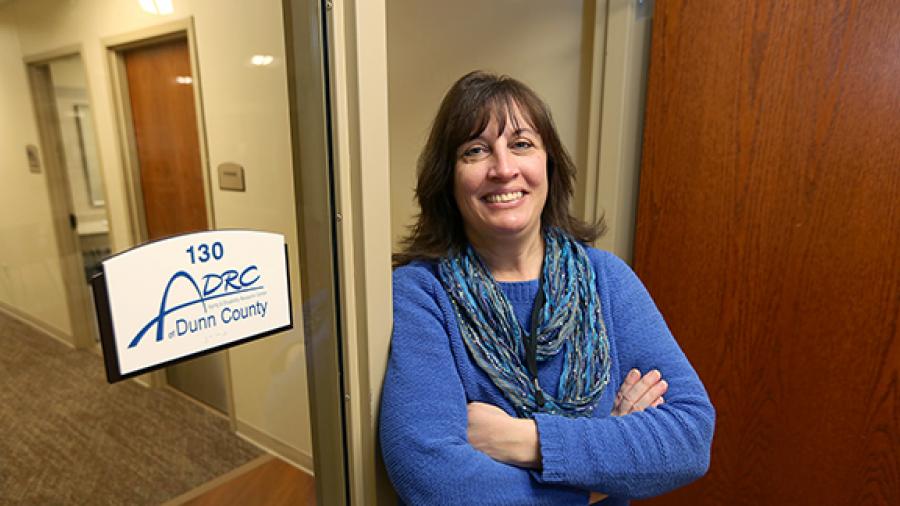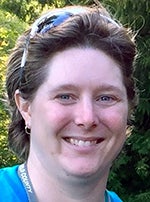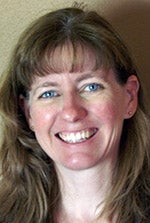
 As a social worker for a smaller county human services agency in northern Wisconsin, Rachel Obiden must be prepared to handle any case that comes her way. A newly earned professional certificate from UW-Stout provides her with additional skills and the ability to become certified as a social worker in Wisconsin.
As a social worker for a smaller county human services agency in northern Wisconsin, Rachel Obiden must be prepared to handle any case that comes her way. A newly earned professional certificate from UW-Stout provides her with additional skills and the ability to become certified as a social worker in Wisconsin.
Obiden is the first graduate of UW-Stout’s new social work professional certificate, an online/hybrid delivery program. Most courses are completed online, with a daylong on-campus class session for each course to practice methods. About 28 more students are expected to graduate in June from the five-course program that can be completed in a year.
The new certificate fills a need for social work certification that many human service positions require, said Crystal Aschenbrener, UW-Stout assistant professor of social work who developed the program.
“Many county positions like child protective services, adult protective services and foster care require social work certification,” she said. “Because there’s more need than available Bachelor of Science in social work programs, the state of Wisconsin will accept sociology, psychology, human development and family studies, vocational rehabilitation and criminal justice degrees along with the social work professional certificate to complete equivalency certification.”
Social workers, counselors and other community and social service positions are projected to increase nearly 9 percent in Wisconsin from 2014 by 2024, according to the state Department of Workforce Development.
 County human service agencies, prisons and corrections facilities, long-term care facilities and school-related settings will benefit most from the certificate program, Aschenbrener said. The online/hybrid delivery method makes the certificate more accessible for workers while continuing to work.
County human service agencies, prisons and corrections facilities, long-term care facilities and school-related settings will benefit most from the certificate program, Aschenbrener said. The online/hybrid delivery method makes the certificate more accessible for workers while continuing to work.
“Now rural places can hire someone and have them take our courses to earn the ability to become a certified social worker so they don’t have to cancel or repost a position. So we’re providing that service to social work entities out there,” she said.
Most students already are working in the field. Some need the certification for their current job, while others pursue it to be eligible for higher-paying jobs.
“It enhances their skills necessary for social worker positions and helps them become more marketable in Wisconsin,” said Aschenbrener, who teaches the courses with associate lecturer Brittany Miskowiec.
Students must apply for acceptance into the program. Two years of related field experience are required. The initial goal was to offer one section of students for fall 2016. Demand required adding another section. Applicants are being accepted for the fall 2017 session.
After earning their certificate, students can test for and earn certified social worker status in Wisconsin. Obiden finished sooner than other current students because she completed two courses via interactive video conferencing.
As alcohol and other drug abuse coordinator and social worker with the Bayfield County Department of Human Services, in Washburn, Obiden mostly works with individuals with addictions who have court orders resulting from emergency detentions. She provides case management, facilitates treatment and follows them through civil court processes, providing support and guidance during the recovery process.
She also works with people suffering from mental illness, which often co-exists with substance abuse. In addition, she responds to reports of potential child abuse and/or neglect and does juvenile intake.
Her credentials include a bachelor’s degree in criminal justice from Northern Michigan University.
“The theories, history, interview techniques and roles of social workers learned in the certificate courses have prepared me not only for my current position but made me more comfortable with the additional duties to which I may need to respond,” Obiden said.
“This experience has also expanded my knowledge so that I will be able to transfer to another social work position/role with ease, further expanding my career options.”
Before the certificate program began in fall 2016, Obiden found no options for taking the courses at colleges north of Highway 8, requiring human service workers to travel long distances and take time off work to attend on-campus classes.
“Professor Aschenbrener and UW-Stout’s development of the online/hybrid program made it possible to work and pursue this certification simultaneously despite not having a university in my back yard,” Obiden said.
Amy White was an access worker for the Dunn County family and children's unit until recently when she became an intake and assessment social worker for the Dunn County Aging and Disability Resource Center. A May 1994 UW-Stout graduate, holding a Bachelor of Science in vocational rehabilitation, she pursued the certificate so she could apply for social work positions. She will be among the certificate program’s May graduates.
“This certificate program allows me to apply for state certification and practice as a social worker in the field. Before, that wasn’t an option for me. It definitely expanded my career options,” White said.
The online/hybrid program fit into her hectic family schedule, allowing her to complete the certification she had put on hold for several years.
Information about the social work professional certificate is at www.uwstout.edu/programs/social-work-professional-online-certificate. To apply for the fall 2017 session, contact Aschenbrener at aschenbrenerc@uwstout.edu or 715-232-1508.
###
Photos
Top and bottom: Amy White, intake and assessment social worker for the Dunn County Aging and Disability Resource Center, is pursuing UW-Stout’s new social work professional certificate. The certificate qualifies graduates for social work certification in Wisconsin.
Second: Rachel Obiden
Third: Crystal Aschenbrener
##




